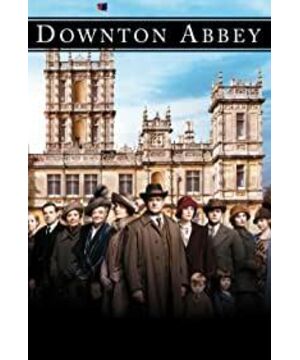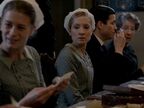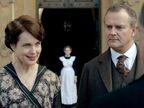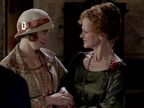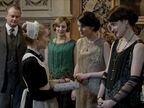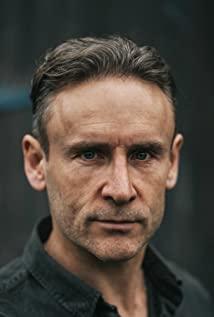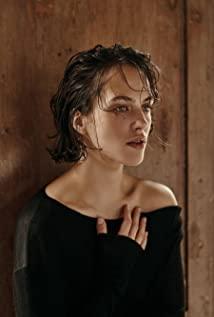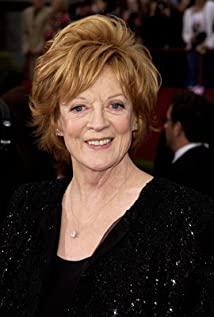I recently revisited the first season of "Downton Abbey". I didn't understand much about the issue of limited inheritance before. This time I feel a little clear, so I wrote it here, and the right should be a guide.
At the beginning of the story, everyone knew the news of the sinking of the Titanic. Poor James and Patrick were also on board, the two of them were immersed in the waters of the Atlantic Ocean, and the Earl and his wife in England began to worry about the problems of a hundred years later.
First of all, we have to understand the relationship between James, Patrick, cousin Matthew and the master. James and Patrick are father and son, and James and the master are first cousins, that is, cousins of the same grandfather. The first cousin here cannot be regarded as a cousin, but the first cousin, which is our cousin in the narrow sense. Brother means. Patrick and the three young ladies are of the same generation and are cousins of the same great-grandfather, and the relationship here is relatively close. Then when it comes to the big cousin, the relationship will be far away all of a sudden. The relationship between him and the master is third cousin, once removed, where third cousin means the third cousin, once removed here means the next generation , that is to say, Matthew's father, the doctor who has long since passed away, is the third cousin of the same generation as the master, and they both have the same great grandfather. And Matthew and the three young ladies are of the same generation, they are the fourth cousin, and their great-grandfather has the same father (Khan...it's too far away, I don't know what the great-grandfather's father should be called).
After clearing up their relatives, we can naturally see that James and the master are still very close. Here, the old lady also complained about James and James' mother. James' mother and the old lady are related to each other. It can be seen that their relationship is not very good.
Now we can talk about the issue of restricting the right of inheritance. In fact, this is not a big problem. The Lord has a title of Earl of Grantham, which can only be passed on to male heirs. Together with Downton Abbey, it is also The castle, as well as the corresponding land and properties on the land, such as the old lady's house, and the house where Matthew's mother and son lived, etc., are all attached to the property under the title, and are inherited with the title. Who inherits the title? , who will inherit these lands and the estates on the land, this is the limited right of inheritance, which was originally no trouble.
But where is the trouble, the trouble is here, here the lady complained about how the late old earl occupied the lady's property so forcefully, which led to this large group of troubles.
The lady came from the United States and brought a large amount of money. This money belongs to the lady and has nothing to do with the master, and it has nothing to do with the manor attached to the title of Earl of Grantham. According to the normal plot, after the death of the master and his wife, the title and manor belong to the heir to the title, while the wife's money belongs to the three daughters. However, because the old earl forced his wife to sign an agreement when his wife and the master married, the wife's property was also bound under the title, that is to say, whoever inherits the title will inherit everything from the master and his wife, then , the surviving wife and three young ladies will have nothing, and can only hope that the heir will give some living expenses according to tradition.
This is the old earl's helpless move. With the development of capitalism, the real aristocrats who do not do anything to produce and exploit are the most reactionary and decadent class in the UK, and their main source of income is exploitation. Tenants of the farm, but this kind of income in the feudal period obviously cannot maintain the luxury life under capitalism, so since the old earl, he has been planning new ways of making money to protect this family business and maintain their luxury. Life. The marriage he planned for his son was undoubtedly his most successful one.
According to the old earl's plan, he will find and marry an heiress for his son, and then combine the wealth of the two families under the title. Then, as long as the heiress gives birth to a son, she can naturally own her property. (Anyway, it's her son, and the family has a title to inherit). It is a pity that the countess did not give birth to an heir, which made the old earl's wishful thinking come to nothing, so the master and others planned a solution for Patrick to marry Mary and let his grandson inherit it, rather than letting him have no blood relationship. Human succession is much better, so far, the countess is still acceptable.
So now that James and Patrick are both dead, the new heir, Matthew, is a distant cousin whom none of them have ever met. A stranger should inherit his property, which annoys the lady very much, and the issue of limiting the right of inheritance will be put to rest. on the table.
Therefore, the old lady put forward a proposal to break the limited inheritance rights and separate the title from the property attached to the title, so that the daughter of the master and the lady can inherit the property, and let the cousin who has never met inherit the title. The heiress mentioned here only refers to the inheritance of property.
The master has always held a negative attitude on this matter. After seeing Matthew, the wife's attitude gradually changed from positive to negative. Only the old lady has been enthusiastic about this matter. After seeing that the limited inheritance rights cannot be broken, she sought Matthew , I hope to find a loophole in the agreement of the year and release the combination of the countess' property and the earl's property. At this time, their demands have changed from the wife's property and the manor to only the wife's property, but this is also impossible. (PS: The "overturning" discussed here should refer to the marriage agreement between the earl and his wife. I have to say that the old earl is really careful.)
So far, all the hard work of the old lady has come to nothing. At that time, the new Earl of Grantham will inherit everything.
That's it for the question of limited inheritance. At this point, I still have no idea, and I want to write something else. The following is a random rant, plus some of the following plots are too long to remember because of the time, but they are just nonsense, don't take it seriously.
The master of Downton Abbey and his family live a rich and elegant life, but this kind of life is unsustainable, because their source of income as feudal landlords is destined to not be able to maintain their luxurious life, so the old earl seized the lady property thing. In the first episode of the TV series, the gay young duke also came to seek their marriage by mistakenly thinking that Mary was an heiress. Even with a dignified duke, how many nobles are embarrassed by money? In the plot of the later seasons, a viscount wanted to marry Cora's mother, but she also took a fancy to her property. Another relative of the earl, another marquis, went to the colony for money. After returning, he moved to the club in embarrassment. , relying on his noble status to receive some pension money from the House of Lords. And our hero, Earl Grantham, first took Cora's property through marriage. In order not to sit still, he invested the money in the Canadian railway project and lost everything. Fortunately, he got it through Matthew. Only the property of Vinia's family can barely maintain their luxurious life, so that the manor will not go bankrupt.
I have to complain about the old man's family here. I deliberately picked up the above scene from the third season. Great-great-grandfather is the great grandfather, then this third-generation earl is the common ancestor of Matthew and the master. The two families have been separated from the fourth generation. In this way, if the middle is always passed down from father to son and son to son To pass on the grandson, then the current earl Robert should be the seventh generation earl, and the seventh generation was in 1900. Then the first generation of the earl became an earl after 1700. From this point of view, unless the first generation was from Other minor titles have risen, otherwise he is also a new noble after the bourgeois revolution. I really don’t know how they made their fortune back then, how after six generations they still can’t make a living in a capitalist society, it was already a capitalist society when they started, and as a result, they still lived on exploitative land rent during the First World War, really. Emotional. There is also the so-called three generations to cultivate an aristocrat. The inheritance of the six or seven generations has already claimed to have a "long history", and they look down on the newly bought aristocratic titles, making it seem that they are the heroes of the War of the Roses or William. The servant of the dragon at the time of the conquest, or the Saxon nobles of the Seven Kingdoms era. Everyone is a new aristocrat in the capitalist era. They open newspaper offices and banks, but Lord Grantham just eats rent like a feudal landlord. Who will look down on anyone who lives by eating the wealth of the households? The so-called aristocratic style, but that's it.
View more about Downton Abbey reviews


